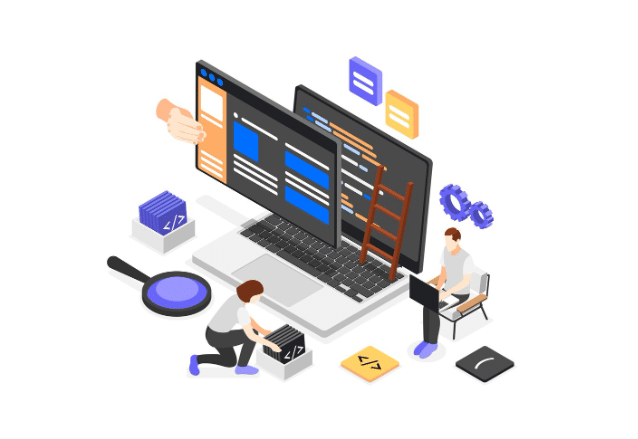Introduction to Artificial Intelligence (AI)
Welcome to the exciting world of Artificial Intelligence (AI), where machines are becoming smarter, faster, and more capable than ever before. From revolutionizing healthcare to transforming finance and enhancing customer experiences in retail, AI is reshaping industries across the globe. In this blog post, we will delve into the evolution of AI, explore its impact on various sectors, and uncover the top trends that are shaping the future. Get ready to unlock the potential of AI as we dive deep into how it’s changing the game for businesses around the world! So sit back and prepare to be amazed by what awaits us in this brave new era of intelligent technology.
The Evolution of AI and Its Impact on Industries
Artificial Intelligence (AI) has come a long way since its inception. From being just a concept in science fiction to becoming a reality, AI has made significant strides in reshaping various industries. With advancements in technology and the increasing availability of data, AI has evolved into a powerful tool that is revolutionizing the way businesses operate.
In the early stages, AI was primarily used for automation and repetitive tasks. However, with time, it has grown more sophisticated and capable of performing complex tasks that were once exclusive to humans. Machine learning algorithms have enabled AI systems to learn from vast amounts of data and make intelligent decisions.
One industry where AI is making waves is healthcare. Healthcare providers are leveraging AI technologies to improve patient care and outcomes. From diagnosing diseases to analyzing medical images, AI-powered systems are helping doctors make accurate diagnoses faster than ever before.
The financial sector is another industry benefiting from the integration of AI. Banks and financial institutions are using machine learning algorithms to detect fraudulent activities and manage risks more effectively. Additionally, chatbots powered by natural language processing enable seamless customer interactions by providing instant assistance.
Retailers are also embracing the power of AI to enhance customer experience. Personalized product recommendations based on past purchases or browsing history help retailers tailor their offerings for individual customers. Virtual assistants like Amazon’s Alexa or Google Assistant provide personalized shopping experiences right at consumers’ fingertips.
While there are numerous benefits associated with the use of AI in various industries, there are also ethical concerns surrounding its development. Issues such as privacy protection, bias in algorithms, and job displacement need careful consideration when deploying these technologies on a large scale.
Top AI Trends Shaping the Future
Artificial Intelligence (AI) is rapidly progressing, and its impact on various industries cannot be underestimated. As we look towards the future, there are several key AI trends that are set to shape and transform the way we live and work.
One of these trends is the increasing use of AI in autonomous vehicles. Self-driving cars have already made their mark, but the potential for AI in transportation goes beyond just automobiles. From delivery drones to smart public transportation systems, AI has the power to revolutionize how we move from one place to another.
Another significant trend is the integration of AI with Internet of Things (IoT) devices. With more and more devices being connected to each other through IoT, AI can help analyze vast amounts of data generated by these devices in real-time. This will enable smarter decision-making and automation across numerous sectors like manufacturing, agriculture, and energy management.
Furthermore, natural language processing (NLP) is becoming increasingly sophisticated thanks to advancements in deep learning algorithms. NLP allows machines to understand human speech or text inputs and respond accordingly. This technology has already found applications in virtual assistants like Siri or Alexa but holds immense potential for customer service interactions as well as translation services.
Cybersecurity also stands out as a crucial area where AI can make a significant difference. As cyber threats become more sophisticated, traditional security measures alone may not be enough to keep up with them. By leveraging machine learning algorithms, AI systems can detect patterns indicative of malicious activities faster than humans can – helping organizations stay one step ahead of cybercriminals.
AI in Healthcare: Revolutionizing Patient Care
Artificial Intelligence (AI) has taken the healthcare industry by storm, revolutionizing the way patient care is delivered. With its ability to process vast amounts of data and analyze complex patterns, AI is empowering healthcare professionals to make more accurate diagnoses, personalize treatment plans, and improve overall patient outcomes.
Many best pharmaceutical company in India has adopted AI technology to get better output in business.
One of the key areas where AI is making a significant impact is radiology. By harnessing machine learning algorithms, AI can analyze medical images with exceptional precision and speed. This not only helps radiologists detect diseases such as cancer at an early stage but also reduces human error rates. As a result, patients can receive timely and accurate diagnoses leading to better treatment options.
Another area where AI is transforming healthcare is in drug discovery and development. Traditional methods for discovering new drugs are often time-consuming and costly. However, with the use of AI-powered algorithms, researchers can now sift through massive databases of genetic information to identify potential targets for drug development more efficiently. This accelerates the process of developing new treatments for various diseases.
Furthermore, AI-driven chatbots are improving patient engagement and support by providing instant access to medical information. These virtual assistants can answer commonly asked questions about symptoms or medications while providing personalized recommendations based on an individual’s health history.
In addition to these advancements, wearable devices equipped with AI technology are enabling remote monitoring of patients’ vital signs in real-time. This allows doctors to track patients’ health conditions outside traditional clinical settings without compromising accuracy or quality of care.
The integration of artificial intelligence into healthcare systems brings immense benefits; however, it also raises ethical concerns surrounding privacy and data security issues that need careful consideration moving forward.
It’s clear that AI has tremendous potential in revolutionizing patient care across various aspects ranging from diagnostics to treatment planning and remote monitoring. The continued adoption and refinement of this technology hold promising prospects for enhancing healthcare delivery worldwide.
AI in Finance: Transforming the Financial Sector
The financial sector is no stranger to technological advancements, and artificial intelligence (AI) is now at the forefront of innovation. AI has the potential to revolutionize how financial institutions operate, making processes more efficient and accurate. Also AI has been used in best cloud based HRM software to smooth and automate the human resource work in finance sector and others.
One area where AI is making a significant impact is in fraud detection. Traditional methods of identifying fraudulent activities can be time-consuming and prone to human error. However, with AI-powered algorithms analyzing vast amounts of data in real-time, suspicious transactions can be flagged instantly.
Another key application of AI in finance is investment management. By leveraging machine learning algorithms, financial advisors can make data-driven decisions when it comes to portfolio composition and asset allocation. This not only improves investment performance but also reduces risk for clients.
In addition, chatbots powered by natural language processing are being used by banks and other financial institutions to provide customer support round the clock. These virtual assistants are able to answer queries quickly and accurately while freeing up human employees for more complex tasks.
Furthermore, AI-based predictive analytics have become invaluable tools for forecasting market trends and optimizing trading strategies. With access to historical data and real-time information sources, traders can make informed decisions based on statistical models generated by AI systems.
As technology continues to advance rapidly, we can expect even further integration of AI into the finance industry. From fraud detection to investment management and customer support, these innovations will undoubtedly reshape how financial institutions operate in the future.
AI in Retail: Enhancing Customer Experience
The retail industry has undergone a significant transformation with the integration of AI technology. From personalized recommendations to virtual shopping assistants, AI is revolutionizing the way customers interact and engage with retailers.
One of the key ways that AI is enhancing customer experience in retail is through personalized product recommendations. By analyzing vast amounts of data on customer preferences and purchase history, AI algorithms can suggest products that are tailored to each individual’s unique tastes and needs. This not only improves the overall shopping experience but also increases sales for retailers.
Another area where AI is making waves in retail is through chatbots and virtual shopping assistants. These intelligent bots can assist customers with their inquiries, provide real-time support, and even help with product selection. They are available 24/7 and can handle multiple queries simultaneously, ensuring prompt assistance for customers at any time of day or night.
Moreover, AI-powered visual search technology allows customers to find products simply by uploading an image or taking a picture. This eliminates the need for text-based searches and makes it easier for shoppers to discover similar items or visually identify products they come across offline.
Furthermore, AI technologies such as facial recognition enable retailers to offer seamless checkout experiences by eliminating the need for traditional payment methods like cash or cards. Customers can simply walk into a store, select their desired items, and leave without having to wait in line – everything will be automatically billed from their account using facial recognition technology.
In addition to these advancements, AI plays a pivotal role in inventory management by accurately predicting demand patterns based on historical data analysis combined with external factors such as weather conditions or events happening nearby stores.
Integrating artificial intelligence into retail operations holds tremendous potential for enhancing customer experiences. By leveraging advanced technologies like personalized recommendations systems, chatbots/virtual assistants,and visual search capabilities along with improved inventory management techniques powered by machine learning algorithms; retailers have new opportunities unleash innovations while improving operational efficiency at scale. The retail landscape is truly being reshaped by AI, providing customers with a
Ethical Concerns Surrounding AI Development
As artificial intelligence (AI) continues to advance and infiltrate various industries, there are growing concerns about the ethical implications of its development. One major concern is the potential for biased decision-making within AI systems. Since these systems learn from data that may contain inherent biases, they can perpetuate and even amplify existing disparities and inequalities in society.
Another ethical concern relates to privacy and data security. With AI collecting vast amounts of personal information, there is a risk of unauthorized access or misuse of sensitive data. This raises questions about consent, transparency, and accountability in how AI handles personal information.
Additionally, there are concerns about job displacement caused by automation driven by AI technology. While it has the potential to significantly improve efficiency and productivity, it also threatens certain jobs that can be replaced by machines.
Furthermore, the use of autonomous weapons powered by AI raises moral dilemmas regarding warfare ethics. The ability for machines to make life-or-death decisions without human intervention poses serious ethical questions surrounding accountability and responsibility.
There is an ongoing debate around liability when things go wrong with AI systems. Who should be held responsible if an autonomous vehicle causes an accident? These legal and moral implications require careful consideration as we navigate the future of AI development.
Conclusion
Artificial Intelligence has undoubtedly become a game-changer in various industries, revolutionizing the way businesses operate and transforming the world as we know it. From healthcare to finance to retail, AI has opened up countless possibilities for improving efficiency, enhancing customer experiences, and making better decisions.
In healthcare, AI-powered technologies are reshaping patient care by enabling early diagnosis of diseases, personalized treatment plans, and even robotic surgeries. This not only saves lives but also reduces medical errors and improves overall outcomes.
The financial sector is undergoing a massive transformation with AI algorithms analyzing vast amounts of data to detect fraudulent activities, make accurate predictions for investments, and provide personalized financial advice. This empowers both individual investors and institutions with valuable insights for smarter decision-making.
Retailers are leveraging AI to enhance customer experiences through chatbots that offer instant assistance, recommendation engines that personalize shopping suggestions based on past behavior or preferences. This creates a seamless shopping journey for consumers while boosting sales for retailers.
However, along with these advancements come ethical concerns surrounding AI development. Issues such as privacy invasion, algorithmic biases affecting decision-making processes can have serious implications if not addressed appropriately. It is crucial that industry leaders collaborate with policymakers to ensure responsible use of AI technologies while protecting individuals’ rights.
As technology continues to advance at an unprecedented pace, it is essential for organizations across all sectors to stay updated with the latest trends in Artificial Intelligence. Embracing these innovations will allow businesses to remain competitive in a rapidly evolving landscape while delivering exceptional value to their customers.

Top 10 IT Certifications That Actually Boost Your Salary in 2026

Amazon Ads vs. Google Ads: Which Platform Drives Better eCommerce Sales?

Where to Buy a Passport Online for Uninterrupted Global Travel



